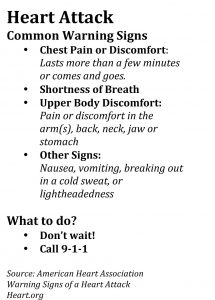Fit or not, pay attention to the warning signs your heart is giving you. Your life depends on it. Even as "fit" fitness professionals, we are not immune to heart disease. Here's how this NASM Master Trainer found out.Recently I made a trip back home to Western New York. Unfortunately, it was for the passing of my 96 year old grandfather. He lived an amazing and long life, one that I hope to experience as well. During the visit I was approached by many relatives and friends about my current medical situation. They remarked, “You look amazing, how can you be the one with a heart issue?” or “You are the last person that I would think of having two stents.”
My heart issue journey began back in December of 2015. I was visiting family and was running outside. I was having trouble breathing but I just chalked it up to the cold weather. Then when I returned to Florida and was running, I felt an immense pain in my chest and I couldn’t breathe very well. I never felt anything like this before. Of course, I just kept on going and thought nothing of it until a few days later when I started getting tingles down my left arm while indoor cycling. Now I knew something was wrong and thought it would be important to check since I had a family history of heart disease. I had thought if I take care of myself physically, exercise, eat right, there will be no problem right? Wrong! After a few tests and some good speculating by the medical staff, they saw that my widowmaker (left anterior descending coronary artery) was 98% blocked. That was a shock since this could have ended my life. They put in a stent and I was feeling better. 
Looking back, the warning signs were there, I just didn’t know much about them. Add to that the grey facial skin discoloration, irritability, and being tired all the time I was experiencing. I just thought it was part of the aging process and a 50-hour a week personal training business.
The doctors thought that this was, what they called, an “anomaly.” I didn’t fit the profile and it was just a strange thing to happen. Just keep living the way you were, take your meds, check back with doctors periodically and best of luck the rest of your life. I continued to feel great. A booming fitness business, I was eating better than before, everything was on the up and up. My wife and I took a trip to Italy, our family was growing as we welcomed our third daughter and bought a house. Life was good.
Then this past year I noticed that my mood was really starting to slip. My wife was staying home to take care of the baby and I started putting in more hours at work. I was getting that tired all the time feeling again and started to gain extra weight that I couldn’t take off. Stress was really getting the best of me.
Then one morning I woke up and I told my wife that I didn’t feel well. I thought I had indigestion the previous night, plus I had discomfort on my left side. I looked in the mirror and I looked horrible. I went to the emergency room and told them my symptoms and my past heart experience. They said that they would probably do a cardiac catheterization to see how well my heart was working, but they were with me, how can this be? I couldn’t believe the results, the same artery was 98% blocked. They put in another stent and now I have had two stents in less than 3 years. Unbelievable.
I recently read in The New York Times about Bob Harper, one of the trainers from The Biggest Loser, about his heart attack experience. He felt the same way I did, took good care of himself and the next thing you know you he was hooked up to tubes and wires lying in a hospital bed.
The article mentions that his Lipoprotein(a) blood levels were high. Normal values for most people are below 30 mg/dL in the blood.(1) Higher levels are associated with triple the risk of heart attack and stroke at an early age since Lp(a) is a type of cholesterol that can lead to a risk of atherosclerosis.(1) The challenge is that most doctors do not routinely test for Lp(a) like they do for LDL and HDL since it is not recommended unless there is a family history of cardiovascular disease.(2)
According to the Lipoprotein(a) Foundation, 1 in 5 people globally have high levels of Lp(a), above 50mg/dL, in their bloodstream. About 1.1% of our population have above 180 mg/dL, which can be potentially life threatening. When I looked at my Lp(a) levels from a 2015 blood test I was astonished to learn it was 220 mg/dL.
Now I understand the impact of genetics. Studies show diet and exercise have very little impact on Lp(a) levels and genetics mostly determines how much your body produces. The risk factor was present on both sides of my family. My dad and uncle both had major bypass surgeries by the time they were 70. My other uncles all died of massive heart attacks in their 50s and my grandmother died of heart attack at 70. I thought if I ate right, exercised regularly, didn’t smoke, I would be ok. Now I know this is not entirely true, while also realizing that these healthy lifestyle factors are still important to reducing the risk of cardiovascular disease.
I have since taken a different approach to my health. Of course, more visits to the cardiologist and blood work to monitor are a must. I am also seeking a second opinion from a top cardiologists in the country. I have also turned to a more plant-based diet which has been linked to lower total cholesterol levels, including LDL. Every morning I meditate for stress relief and incorporate yoga into my exercise routine five days per week.
Read more: for how plant-based diets affect weight loss.
If you have a family history of heart disease talk with your doctor about an Lp(a) test. They can then refer you to a specialist if needed. There is also the Lipoprotein(a) Foundation that can help you with questions or refer you to a specialist. Educate yourself on heart attack warning signs and don’t ignore them. If you are a physical trainer, encourage clients to seek regular checkups. Your life may depend on it- mine did. Twice.
Help others to stay fit and encourage wellness in clients
Become a personal trainer online with NASM and help put health heart issues in perspective for clients. And remember to encourage clients to get regular check-ups. Just because you are fitness in body, doesn't guarant
References:
- Rallidis, Loukianos S. et al. (2018) High levels of lipoprotein (a) and premature acute coronary syndrome. Atherosclerosis , Volume 269 , 29 – 34.
- “Lipoprotein-a.” MedlinePlus Medical Encyclopedia, U.S.National Library of Medicine, 5 May 2016, medlineplus.gov/ency/article/007262.htm.
















